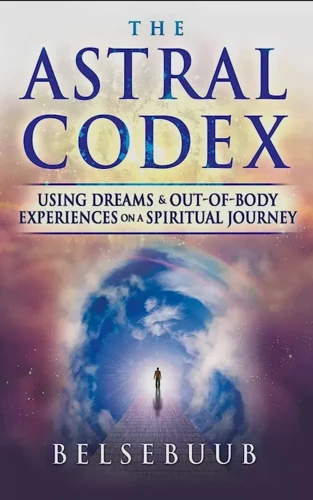As humans, we often find ourselves searching for answers to life’s mysteries, including what happens after we die. One phenomenon that has garnered attention and curiosity is the out-of-body experience. This seemingly inexplicable occurrence involves a person’s consciousness leaving their physical body and entering a realm beyond our usual sensory perception. At first glance, it’s a puzzling concept that can challenge our understanding of the nature of life and death. But with closer examination, we can begin to unravel the layers of this fascinating subject and explore the commonalities and differences in reported experiences, potential causes, and the implications for spirituality and personal growth.
What is an Out-of-Body Experience?

The human mind continues to astound and perplex even the most learned scholars of medicine and psychology. One of the most mysterious and fascinating psychological phenomena that has enthralled experts and the public alike is the out-of-body experience, or OBE for short. An OBE involves the sensation of leaving one’s physical body and observing the world from a vantage point outside of it. It is a subject of endless speculation and debate, and its causes and implications have been a topic of study for many years. In this section, we will explore the definition of OBE, the different types of experiences, and the commonly reported sensations associated with this fascinating phenomenon.
Definition and Commonly Reported Sensations
Out-of-Body Experience, commonly known as OBE, refers to the feeling of separation from one’s physical body. In this state, a person feels as though they are watching their body from a distance or floating above it. There are several commonly reported sensations during an OBE. An overwhelming sense of peace and serenity is often reported, as well as a heightened awareness of surroundings and altered perceptions of time and space.
People experiencing OBEs also report a range of physiological sensations. Intense vibrations and a buzzing sensation are often felt throughout the body during the initial stages of the experience. This may be followed by a floating or rotating sensation, tingling or numbness, or a surge of energy.
Additionally, people experiencing OBEs often report a sense of detachment from their physical body. They may feel as though they are outside their body, looking down at it, or floating above it. This detachment may be accompanied by a feeling of weightlessness or a loss of physical sensations. Some people also report fully entering another realm or dimension during OBEs.
It’s important to note that while OBEs can be an incredible and transformative experience, they can also be frightening or unsettling for some individuals. The sensations and experiences reported during an OBE can vary greatly from person to person.
Types of Out-of-Body Experiences
Out-of-body experiences (OBEs) are a fascinating subject for many people, but did you know that there are actually different types of OBEs? Here are some of the most commonly reported types and their distinguishing features:
| Type of OBE | Description |
|---|---|
| Astral Projection | Astral projection is probably the most well-known type of OBE. This experience involves the feeling of a conscious awareness somatically leaving the body and exploring the world almost as if the person has disembodied from their physical form. Some people assert that they are free to travel over vast distances, even as far as other planets, without any limitations. |
| Near-Death Experience (NDE) | Near-death experiences or NDEs are typically associated with people who have been close to dying or have been resuscitated. This type of OBE often involves seeing a bright white light or a tunnel, meeting deceased loved ones or spiritual beings, and having a profound sense of peace and love. |
| Remote Viewing | Remote viewing involves an individual attempting to psychically glean information about a location, object, or event at a distance from their physical body. This technique is often used in psychic and espionage work and is controversial among scientists and skeptics alike. |
| Lucid Dreaming | Lucid dreaming is a type of experience where a person becomes aware they are dreaming and can control the direction and outcome of the dream. During lucid dreaming, people may feel like they have left their body and can explore their surroundings without physical limitations. While not always classified as an OBE, it shares many of the same features as other OBEs. |
| Spontaneous OBE | A spontaneous OBE occurs without intent or preparation. These occurances are often fleeting and occur spontaneously either when people are waking up or falling asleep. They may involve an individual seeing their body from a different perspective or exploring their surroundings without the limitations of their physical form. |
As you can see, there are many different types of OBEs with varying features and experiences. Regardless of the form the OBE takes, it can be a profound and life-changing event for those who experience it.
Causes of Out-of-Body Experiences

Many people have reported experiencing the strange sensation of being outside of their own body, but what causes this phenomenon? The answers are varied and complex, with experts and enthusiasts debating a range of theories. Some suggest that out-of-body experiences are the result of near-death experiences, while others propose that psychological factors are to blame. Additionally, some argue that spiritual practices can bring on these transcendent moments. Join us as we delve into these theories and try to unravel the perplexing causes behind out-of-body experiences.
Near-Death Experience
Near-death experience (NDE) is one of the most commonly reported causes of out-of-body experiences. It has been estimated that around 4 to 15 percent of people who have survived a close brush with death have experienced an NDE. During an NDE, individuals typically report feeling separated from their physical body, experiencing a sense of peace and joy.
Some of the commonly reported sensations during an NDE include feeling weightless, seeing bright light, encountering deceased loved ones, and moving through a long tunnel. Some individuals report having a life review, where they see their entire life flash before their eyes.
There are various explanations for why an NDE can lead to an out-of-body experience. Some researchers suggest that the release of endorphins in response to the stress of the event might trigger the experience. Others propose that a temporary disruption of brain function due to decreased oxygen supply may contribute to the sensation of leaving the body.
Despite the prevalence of NDEs, there is still much controversy and skepticism around the phenomenon and its significance. Some skeptics argue that the experiences are merely hallucinations or delusions, while others point to certain accounts that can be attributed to psychological or physiological factors. Nonetheless, proponents of the spiritual significance of NDEs argue that the experiences provide evidence of an afterlife and the existence of a higher power.
Sleep Paralysis
Sleep paralysis is a type of out-of-body experience that occurs during the transition between sleep and wakefulness. This experience is characterized by the inability to move or speak while awake, despite being aware of one’s surroundings. The experience is often accompanied by a sense of pressure on the chest and a feeling of suffocation.
There are several factors that can contribute to sleep paralysis. These include irregular sleeping patterns, disruptions in the sleep-wake cycle, and certain medications. Additionally, those who suffer from mental health conditions such as anxiety or depression may be more prone to experiencing sleep paralysis.
Sleep paralysis has been reported throughout history and across cultures, and has often been attributed to supernatural causes such as demons or ghosts. However, modern science has provided more plausible explanations for this phenomenon.
One such explanation is that during sleep paralysis, the brain is still in a state of REM sleep, which is the stage of sleep associated with dreaming. During REM sleep, the brain inhibits movement to prevent individuals from acting out their dreams. In sleep paralysis, this inhibition continues while the individual is awake, leading to the sensation of paralysis.
While sleep paralysis can be a frightening experience, it is generally not harmful and does not require medical treatment. However, individuals who experience frequent or severe episodes of sleep paralysis may benefit from consulting a sleep specialist.
While sleep paralysis may be a strange and unnerving experience, it is a natural occurrence that can be explained by science.
Psychological Factors
While some out-of-body experiences can be attributed to physiological factors, others believe that psychological factors may also play a role. Here are some of the ways that psychology may be related to out-of-body experiences:
- Stress and Trauma: Extreme levels of stress or trauma can cause the mind to detach from the body as a form of dissociation. This can occur as a safety mechanism to protect oneself from further harm. In such cases, people may feel as if they are observing their own experiences from a distance, creating the sensation of an out-of-body experience.
- Meditation: Some people believe that meditation can induce out-of-body experiences, as it involves a deep level of concentration and focus. Practitioners suggest that meditative practices can help individuals enhance their sense of self-awareness, leading to a disassociation from the physical body.
- Depersonalization Disorder: Depersonalization disorder is a psychological disorder that can cause individuals to feel detached from their own thoughts, emotions, and body. While not all individuals with depersonalization disorder will experience out-of-body experiences, some may report feeling as if they are watching themselves from the outside, which can be similar to an out-of-body experience.
- Hypnosis: During hypnosis, individuals enter into a trance-like state where they are highly suggestible to the guidance of a hypnotist. While not all forms of hypnosis will induce out-of-body experiences, some practitioners may use hypnosis to help individuals disassociate from their physical bodies, leading to an out-of-body experience.
While there is still much to be understood about the phenomenon of out-of-body experiences and the role that psychology may play, it is clear that this is a complex and multifaceted phenomenon. It is likely that the relationship between psychological factors and out-of-body experiences is unique for every individual, and further research is needed to fully understand these connections.
Spiritual Practices
Various spiritual practices have been known to induce out-of-body experiences, often referred to as astral projection. Many proponents of these practices believe that the phenomenon can be used to explore the spiritual realm and gain a deeper knowledge of oneself and the universe. However, skeptics argue that these experiences are merely hallucinations induced by specific practices. Here are a few examples of spiritual practices that are linked with inducing out-of-body experiences.
| Spiritual Practice | Description |
|---|---|
| Meditation | Meditation is a practice of focusing the mind on a specific object, thought, or activity to achieve a mentally clear and emotionally calm state. This practice has been linked to inducing out-of-body experiences by helping practitioners to dissociate from their physical bodies. |
| Lucid Dreaming | Lucid dreaming is a practice of becoming aware that one is dreaming during sleep and then gaining control over the dream. The practice involves developing self-awareness and self-control during dreams, and some practitioners believe that it can lead to out-of-body experiences when the boundary between the dream world and physical reality is blurred. |
| Visualization | Visualization is a practice of creating mental images to achieve specific goals or outcomes. Some practitioners believe that visualization can help induce out-of-body experiences by creating a mental environment that is conducive to the dissociation of the physical body. |
| Shamanic Journeying | Shamanic journeying is a practice of entering an altered state of consciousness to communicate with spirits or ancestors. Practitioners may use visualization, drumming, or other methods to induce an altered state of consciousness, which can sometimes lead to out-of-body experiences. |
While the scientific community remains skeptical of the validity of these practices in inducing out-of-body experiences, many individuals practice them regularly and report profound experiences. Whether these experiences are spiritual in nature or simply a result of certain psychological and neurological states, the phenomenon of out-of-body experiences remains a fascinating and intriguing topic.
Out-of-Body Experiences and Spirituality

As humans, we strive to understand the realms beyond our physical world, and spirituality has offered us the means to do so. The concept of Out-of-Body Experiences (OBEs) has a long-standing association with spirituality, as it challenges the limitations of our physical existence and grants us a glimpse of the transcendent. Observations of OBEs have been reported in various spiritual traditions throughout human history. In this section, we will explore the correlation between OBEs and spirituality, highlighting their relation to beliefs in the afterlife and their role in spiritual growth and development.
Relation to Beliefs in Afterlife
Beliefs in an afterlife have been present in religions and cultures worldwide for centuries. Many people who have experienced out-of-body experiences strongly believe that they provide evidence of an existence beyond physical death. This belief stems from the sensation of leaving the body and observing the physical world from a separate vantage point.
In Eastern religions, such as Hinduism and Buddhism, the concept of an afterlife or reincarnation is deeply embedded in the culture. The idea that the soul can exist beyond the physical body is considered a fundamental truth. This belief is reinforced by techniques such as meditation and astral projection, which aim to help individuals achieve states of consciousness that allow them to experience alternate realms of existence. For many adherents of these religions, out-of-body experiences help confirm their faith in a greater spiritual reality beyond the physical realm.
Similarly, some proponents of New Age spirituality view out-of-body experiences as a means of connecting with higher states of consciousness and the divine. They believe that the physical body is merely a vessel for the true self, and that consciousness can exist apart from the material world. Out-of-body experiences can be seen as an affirmation of this belief system, as they allow individuals to perceive the world from a non-physical perspective.
However, not all religious or spiritual traditions embrace the concept of out-of-body experiences as evidence of an afterlife. Some groups believe that the experiences are the product of subtle energy or vibrations that occur within the physical body, but do not necessarily indicate the existence of a separate soul or consciousness. Skeptics of out-of-body experiences point to the lack of scientific evidence supporting such claims and suggest that they may be the product of natural brain processes rather than actual experiences of the afterlife.
Despite the controversy surrounding the relationship between out-of-body experiences and beliefs in an afterlife, they remain a source of fascination for many people. Whether they are perceived as a glimpse into the unknown or a confirmation of existing beliefs, these experiences continue to inspire discussions and debates about the nature of consciousness, spirituality, and the human experience.
Role in Spiritual Growth and Development
Out-of-body experiences (OBEs) have been linked to spiritual growth and development by many people. While there is no concrete evidence to prove this correlation, many individuals who have experienced OBEs report a feeling of enhanced spirituality, a deeper connection to the universe, and a sense of purpose.
One possible explanation for this phenomenon is that OBEs allow individuals to experience a reality beyond the physical realm, leading to a greater understanding of the interconnectedness of all things. This increased awareness can lead to a heightened sense of spirituality and a greater appreciation for the mysteries of the universe.
Additionally, individuals who have experienced OBEs may feel a greater sense of purpose or direction in life, as the experience can provide them with a renewed appreciation for the fragility and preciousness of life.
While there is no scientific evidence to support the idea that OBEs lead to spiritual growth and development, many individuals have claimed that the experience has had a profound impact on their spirituality and sense of purpose.
| Enhanced Spirituality | OBEs have been reported to allow individuals to experience a reality beyond the physical realm, leading to a greater understanding of the interconnectedness of all things. |
| Sense of Purpose | The experience of having an OBE can provide individuals with a renewed appreciation for the fragility and preciousness of life, leading to a greater sense of purpose. |
| Connection to the Universe | Many people who have experienced an OBE report feeling a deeper connection to the universe and an increased awareness of the mysteries of existence. |
Critiques and Controversies
As with any topic that delves into the mysteries of human experience, the phenomenon of out-of-body experiences is not without its fair share of critiques and controversies. Many skeptics dismiss the idea of consciousness being able to leave the physical body, instead pointing towards scientific explanations such as hallucinations or temporary disconnection of sensory input. However, there are also religious and cultural disputes that arise from differing beliefs and interpretations of these experiences. So, let’s take a closer look at the critiques and controversies surrounding out-of-body experiences.
Scientific Skepticism and Explanations
The phenomenon of out-of-body experiences has been a topic of scientific scrutiny and skepticism. While some people claim to have had an out-of-body experience, there is no concrete evidence to support the idea of consciousness leaving the body. Scientists seek to explore and explain such experiences using a variety of theories and perspectives. Here are some possible scientific explanations for the phenomenon of out-of-body experiences:
1. Neurological Explanations. Some scientists believe that out-of-body experiences could be attributed to neurological dysfunction or abnormalities. For instance, the sensation of floating or hovering might be related to disorders in the inner ear, which affect balance and spatial perception. Others suggest that the experience of leaving one’s body might be related to altered states of consciousness, such as in cases of epileptic seizures or migraines.
2. Psychological Explanations. Some psychologists argue that out-of-body experiences are subjective experiences that occur during times of extreme stress, trauma, or altered states of consciousness. For example, some people may experience an out-of-body episode during sleep paralysis, a condition in which the body is essentially paralyzed while the mind is still awake. Some researchers also suggest that the experience might be influenced by individual personality traits, such as an inclination towards dissociation, fantasy-proneness, or suggestibility.
3. Cultural and Social Explanations. Some scholars suggest that out-of-body experiences might be culturally or socially contingent phenomena. In other words, the way people interpret and describe their experiences might be influenced by their cultural or religious background, as well as by individual expectations and beliefs. For instance, some cultures might interpret the experience as a visitation from ancestors or guardian spirits, whereas others may view it as a symptom of mental illness or demonic possession.
Despite these scientific explanations, many people who have had out-of-body experiences feel that they are real and meaningful. Regardless of the cause of the experience, some believe that it has a spiritual or transformative quality that can enhance our understanding of consciousness, self-awareness, and transcendent states of being.
Religious and Cultural Disputes
One of the major disputes surrounding out-of-body experiences stems from differing religious and cultural beliefs. In many cultures, the notion of the soul leaving the body and traversing other realms is a fundamental tenet. For example, in Hinduism, the astral body is believed to leave the physical body during sleep, which can result in lucid dreams and other types of out-of-body experiences. Similarly, in shamanistic traditions, individuals may use trance-like states to communicate with spirits and ancestors.
However, other belief systems reject the idea of the soul leaving the body altogether. In Christianity, for example, it is commonly believed that the soul remains united with the body until the moment of death, at which point it either ascends to heaven or descends to hell. The idea of astral projection or out-of-body experiences can be seen as conflicting with these beliefs.
Moreover, there are cultural differences in how out-of-body experiences are interpreted and understood. For example, in Western cultures, these experiences are often viewed through a lens of individualism, as proof of the autonomy and uniqueness of the self. In contrast, some Eastern cultures may view out-of-body experiences as evidence of a less distinct boundary between the self and the external world.
Furthermore, within specific religions, there can be disagreement over the legitimacy and morality of out-of-body experiences. Some conservative religious groups view these experiences as sinful or dangerous, while others view them as a means of achieving spiritual growth and enlightenment.
The religious and cultural disputes surrounding out-of-body experiences highlight the complex intersections of belief systems and individual experiences. While some cultural and religious traditions embrace the idea of the soul leaving the body, others reject it. Similarly, opinions on the morality and significance of these experiences also vary.
Conclusion
In conclusion, the phenomenon of out-of-body experiences continues to intrigue and fascinate individuals across cultures and beliefs. While some explanations for OBEs may be rooted in scientific and psychological factors, others point to the potential for spiritual growth and development. Regardless of the cause or interpretation, the reported sensations and experiences of individuals who have had OBEs cannot be dismissed. The controversy surrounding the validity and implications of OBEs highlights the need for continued research and open-mindedness towards the unknown.
It is important to note that while some skeptics may dismiss OBEs as just hallucinations or dreams, many scholars and researchers continue to study and explore this phenomenon. Scientific explanations and criticisms continue to be debated, and the cultural and religious meanings surrounding OBEs vary across different communities. However, it is undeniable that the experiences of individuals who report OBEs can have a profound impact on their beliefs and perspectives.
Ultimately, the phenomenon of out-of-body experiences remains shrouded in mystery and complexity. It offers a glimpse into the potential for consciousness to transcend the physical body, and invites us to reconsider our understanding of the mind and spirituality. As science and spirituality continue to intersect and evolve, the exploration of OBEs will undoubtedly continue to be a subject of intrigue and debate.
Frequently Asked Questions
What are the common sensations experienced during an out-of-body experience?
Some people report sensations such as floating, the feeling of leaving their body, or seeing themselves from an external perspective.
Can anyone have an out-of-body experience?
While anyone can potentially have an out-of-body experience, they are not always easy to induce and may require specific methods or certain physiological or psychological conditions.
Is an out-of-body experience the same as lucid dreaming?
No, they are different experiences. Lucid dreaming involves being aware that you are in a dream state and may involve controlling the dream environment, whereas an out-of-body experience involves feeling that your consciousness has left your physical body.
Can out-of-body experiences be dangerous?
While out-of-body experiences are generally considered to be safe, some people may experience fear, confusion, or disorientation as a result of the experience.
Are out-of-body experiences related to psychedelic drugs?
Some individuals report having out-of-body experiences while under the influence of certain psychedelic drugs, but there is not a well-defined relationship between the two phenomena.
Do out-of-body experiences provide evidence of an afterlife?
While some individuals view out-of-body experiences as evidence of an afterlife, the scientific community remains skeptical and there is no conclusive empirical evidence to support this claim.
Are out-of-body experiences only experienced by those with a spiritual belief?
No, out-of-body experiences can be experienced by individuals regardless of their spiritual or religious beliefs.
Can out-of-body experiences be induced through meditation?
Some individuals report having induced out-of-body experiences through meditation, but it is not a guarantee and may require specific techniques or levels of experience.
Can out-of-body experiences be accurately measured or recorded?
Currently, there is no precise or reliable way to measure or record out-of-body experiences.
What can be done to reduce the fear or disorientation commonly associated with out-of-body experiences?
Some individuals find that focusing on positive or calming thoughts, practicing relaxation techniques, or seeking support from a mental health professional can help reduce the negative emotions associated with out-of-body experiences.








